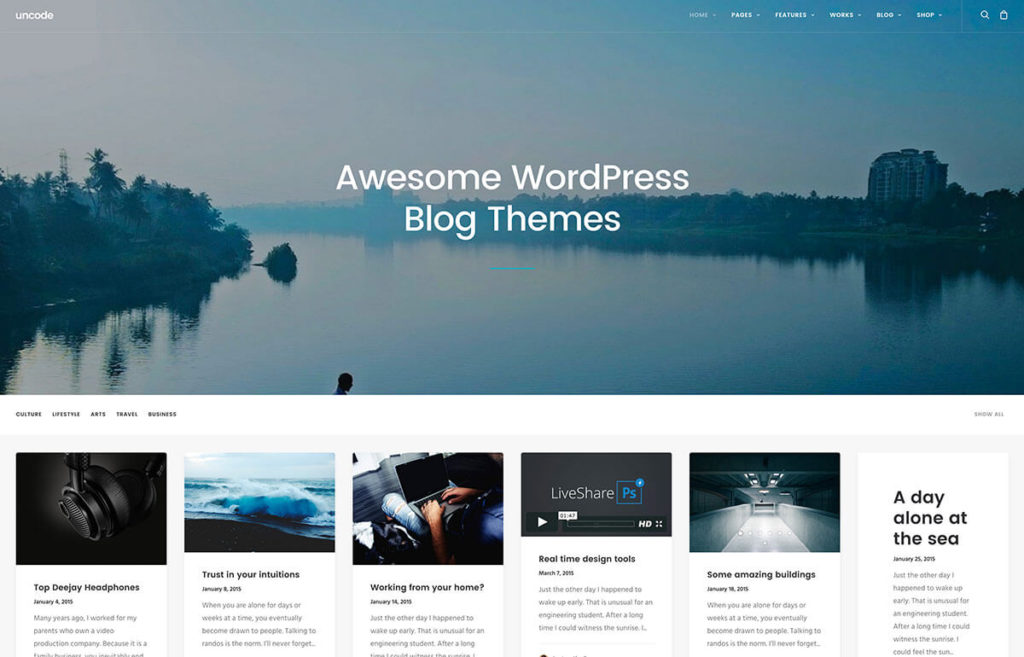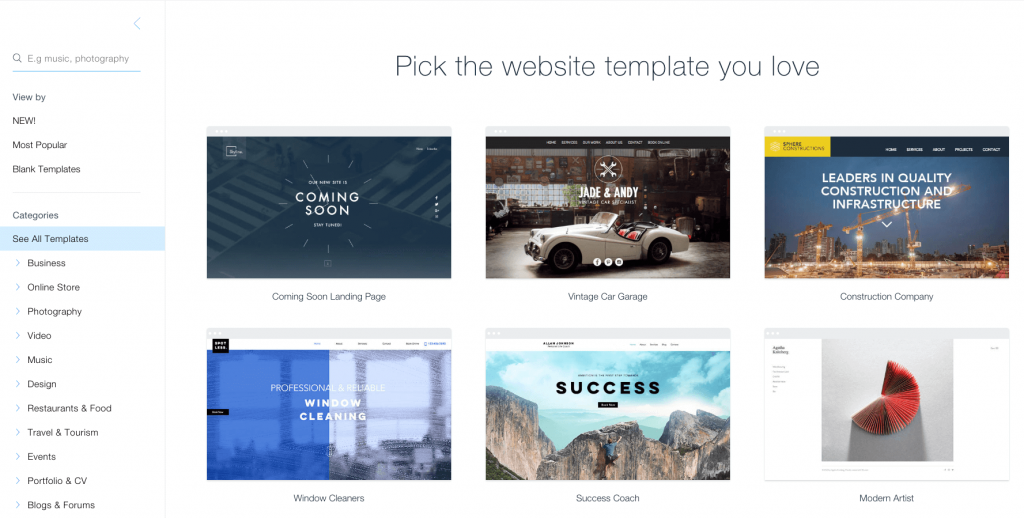Whether you’re starting a blog as a means to starting an online business, or whether you just want a platform to broadcast from, this guide to how to start a blog UK will help get you started.
In this guide to how to start a blog UK…
- What type of blog?
- 3 things you’ll need to start your blog
- 5 Best Blogging Platforms
- How To Start A Blog – Do’s And Don’ts
- Blog Leads, Sales & Results
- How to start a blog UK FAQs
There are so many different things to think about when starting a blog, and so many different blogging platforms you can use. But first, we need to establish what type of blog you want to set up.
What type of blog?
Firstly you’ll want to have a goal in mind. What are you aiming to achieve through your blog? Do you want to pull in more users to your sales pages by writing about your brand, to increase its publicity?
Do you want to build a blog that promotes brands and products from other companies? Or do you just want to set up a blog documenting your travels around the world?
In order to pick the best website builder for your blog, you’ll want to have a grasp before you start of how big you’re planning on your blog being, whether you’re going to monetize it, and what type of blog it’s going to become.
For example, if you’re planning on building an affiliate blog, you’ll be writing a lot of content and will benefit from having a more comprehensive blogging platform tools to promote conversions.
But if you’re looking to just set up a personal, or a personal brand blog talking about yourself and your brand, you may not perhaps need as many comprehensive features as you would if you were building an affiliate blog.
You may also want to build an online portfolio of your work, which could require an entirely different blogging platform, as opposed to the traditional blog that hosts articles and journals.
3 things you’ll need to start your blog
1. A blogging platform

After you’ve identified the type of blog you want to set up, plus whether you want to monetise it, you’ll then need to pick a blogging platform suited to your needs.
Many people chose to operate on WordPress as it is one of the most comprehensive blogging platforms going, but they forget platforms like Wix and Squarespace that are great for both helping you save and make money and are best suited for those who are less tech-savvy and are new to the blogging game.
If you’re blogging for business, you might want to think about using LinkedIn for your business blog. We’ll go into more detail on what platforms are best for your blog shortly, but make sure to keep in mind your objectives and technical experience when choosing the right platform for you.
2. A hosting platform
Every website needs a web host to store their website’s information on the internet. A web host is an online service provider that will store your website’s information on one of its servers and keep your website online.
The best web hosts will perform a variety of functions for you, for example, Wix is an all-in-one package that will host your website for you, allow you to register a domain name, and has easy to use website design tools to help you start your blog.
Web hosting can be expensive for new starters, so make sure you pick the best value for money host that can cater to the amount of traffic you have running through your website.
3. A domain name
I’m sure by now you already know what sort of blog you want to set up, whether that’s a travel, blog, a blog accompanying your online store, or perhaps an affiliate marketing product review blog. You’ll have a niche and an idea and now all you need is a name. Every website online has what’s called a domain name.
It’s included in the website address at the top of your search bar, for example, our domain name is ‘www.digitalsupermarket.com’.
You’ll need to register a domain name after you purchase a hosting plan, to enable customers to find your site quickly and easily. Pick a great domain name that is easy for customers to read and type into Google so they can find it easier online.
5 Best Blogging Platforms
There are a wealth of website builders out there catering to all your blogging or online portfolio needs. We have listed some of the main ones below shedding some light on what needs they service and why they might be a great option for you.
WordPress – The best platform to give you full customisation
WordPress is perhaps one of the most renowned blogging platforms in the world, running approximately 35% of the internet. It’s favoured highly by professional bloggers because it gives you total freedom to do whatever you want with your blog.
WordPress can help you build your blog using one if its search engine optimised themes, you can customise using its drag and drop website builder tool to create a stunning blog.
What’s more, is you’ll be able to use its professional blogging service to post your content online and take advantage of the hundreds of third party app plugins, you can integrate into your blog, to improve automation, add new features, and drive traffic to your site.
The only downside of WordPress is that it can be quite technical and can take some time getting used to, but once you’ve got the hang of things, you’ll have great control over everything on your webpage.
Wix – Best for monetising your blog easily

Wix is probably the most streamlined and easiest blog providers. It’s so simple and easy to use, it’s therefore great for anyone just starting out in the blogging world.
You can customise one of its stunning templates with Wix’s drag and drop editor, and then upload blog posts to your site by slotting in pictures, gifs, social media buttons, sidebars, and other widgets that will help your blog stand out.
One of the coolest features about Wix is its marketplace integration, where you can install a whole variety of third-party applications to your blog to provide your users with greater features and usability.
Wix is the perfect all-in-one blogging solution to help you easily build a platform to amplify your business to the world, helping you to make more money, but it can also save you a lot of money as it’s cost-efficient plans roll up, web hosting, blog posting, and domain registration all into one product!
Squarespace – Best for creating visually stunning blogs
Squarespace is very similar to Wix, in that it is an all-in-one web building and blogging platform that can help you build a blog you can monetize efficiently. It sets itself aside though through its better design and customisation features, making it one of the best platforms on the marketing if you’re looking to design a visually aesthetic blog.
I’d recommend using this platform if you are a business operating in some sort of design, arts, or culinary industry. Although it offers minimal template options, Squarespace’s templates are works of art and offer you great customization when building your blog.
Plus Squarespace offers a great blogging tool that lets you schedule posts and customize your blog to suit more mobile audiences.
LinkedIn – Best for business blogging
Aside from setting up a blog on your own site, corporate entities can use LinkedIn to enhance and amplify their presence online. LinkedIn has more than 575 million users, most of whom are professionals and members of corporate conglomerates, and you can use this social platform to target some of the most influential people in the world.
If you’re blogging about business this is the perfect platform to use a pre-existing community of people to enhance your social standing. You’ll then be able to build connections and followers on your profile who can easily share your blog on their platform through a couple of simple clicks.
Instagram – Best for photo blogs
Instagram is one of the biggest blogging sites in the world and without realising it, we are all technically bloggers in some way with our Instagram accounts, right? Ultimately for professional use, it is great for building a portfolio that has some form of visual or graphic eye-catching media around it.
Instagram lets you post videos, photos, boomerangs, even write a blog in the photo’s caption if you wanted to! Best of all, Instagram is free, and you can use its business software to link up your online store, to drag users away from your profile, using its product tagging features, and land them in your online checkouts.
Our top tip for using Instagram is to post regularly and keep on the theme of your blog. Don’t go off-piste as you’re followers will catch on quickly and unfollow you. And with 1 billion people using the platform each day, it is a great way to gain people’s attention and build your brand’s presence online.
How To Start A Blog UK – Do’s And Don’ts
Here are a couple of top tips to bear in mind when building your blog.
The Don’ts
Don’t use complicated language too soon
With that in mind, do include language that your target audience will understand. But remember they are still here to learn, so don’t drop people in at the deep end right away by using complex jargon off the bat.
Define terms and spell it out in layman’s terms for people at the outset, and as the post goes on, then introduce more complex writing. Introducing technical jargon at the start of your posts is an instant turn off for most readers.
Don’t waffle – Keep it succinct
People want to get to the punchline now.
43% of people admit to skimming through blogs to get to the information they need, meaning to get your blogging site converting leads, you need to engage the reader early on and offer information succinctly throughout your post. Plus don’t make your blog too long.
Depending on what you’re writing, a lot of people will see large volumes of text and will switch off immediately.
There is no set limit for what a good and bad amount of text is, that’s something you’ll have to figure out per your industry, but from my experience, the shorter, the better.
Don’t make headlines too long
Also ensure that your headline is not more than 60 characters long. If it gets too long it won’t rank well in search engines and people just won’t want to read it. Use an SEO tool or plugin such as Rank Math to help you write great content.
Don’t plagiarise or use credited images
Copying other people’s work is lazy and can land you in a lot of hot water in extreme cases if you breach a copyright regulation. But it’s also just unfair on the person who has worked hard or been creative to write that work.
The same goes for images, people need to make a living from the content and photos they’re taking so don’t steal that off them.
The Do’s
Do write killer headlines
People are like goldfish. You only have about 3 seconds to get their attention when researching a topic online. That’s why it is important to write catchy and enticing headlines to draw your reader in. One good way to do it is to use the “How To” and “10 Best” strategies.
These sorts of titles: ‘How to start a blog UK’ or ‘the 10 best web hosting platforms’ are favoured by online SEO experts and can help your blog post get clicks.
Do post regularly
The key to creating a great blog that builds leads is posting regularly. Although it is not the best idea to post regularly. Ideally, you want to post 3-4 times a week to get the best influx of traffic to your site.
You’ll also want to check out when’s best to post for your target audience, for example, if you’re in the financial trading market, you’ll want to post your blogs perhaps at 8am, before the markets open when city workers are on their staring at their phones on their morning commuter trains to the city.
Do share on social media
Share your content far and wide on your social platforms. Everyone is on social media these days and its outreach is simply phenomenal. That’s why you should always share your posts to your social channels to get greater traffic on your website, and include share buttons all-around your blog to invite your readers to share your articles too!
Check out these social media management tools to help you automate your posting and increase content engagement.
Do use SEO keywords to drive more traffic
In a nutshell, SEO keywords are the phrases people put into search engines when they are looking for information on a certain subject. They are how you get found on your website.
Depending on what you are writing about, there is always a set of keywords relating to that topic that you can implement, to help you show up higher in people’s google searches. For example, people might regularly search in google, ‘what is the best compost for growing sunflowers?’
When you come to writing about growing sunflowers in your blog, you might want to use these words or incorporate this question into your blog somewhere, to help you rank higher on Google.
Check out these SEO tools and WordPress plugins to help you find keywords and improve your blogs SEO performance.
Do use call’s to action to take your readers to the next step
If you don’t challenge your reader at the end of your blog to follow you on Instagram, or check out your sales pages, you’ll never get the leads or sales you are looking for. With that in mind, build compelling calls to action at the end of each of your posts, to pull readers into taking the next step.
Check out our landing pages design guide to see how to implement calls to action on your site.
Do identify a target audience
People will often tell you to write as though you were in the shoes of the person you’re looking to bring to your website, but it’s true! Identify what type of people you’re writing to, for instance, if you’re writing a business blog about FOREX trading, you’ll write with potential traders in mind who have one eye on the stock market and the other on your blog.
Or if you’re a wedding florist, you’ll set your portfolio up to target those people looking to get married in the next year.
Blog Leads, Sales & Results
Blogging is one of the most influential marketing strategies in the world and the best bloggers can reap some awesome rewards for producing some truly awesome content.
It is fairly straightforward to get started and we advise if you’re a small business, or someone with minimal blogging experience, to try out Wix or Squarespace first before you jump into using more technical platforms like WordPress.
Once you’re up and running remember our top tips on what to do and what to avoid when writing your blog. Plus don’t forget to think about optimising and adding useful applications to your site to help you build and grow your content.
Thinking of setting up a new business? Check out our guide for a step-by-step checklist of everything you need to do.
How to start a blog UK – FAQs
How do bloggers get paid?
Bloggers typically make a living by hosting advertisements on their site, getting sponsorships or promoting affiliate links. In other words, rather than directly selling products or services, they use the influence and popularity they gather to direct their audience towards other companies, who in turn reward the blogger.
Of course, sometimes they do sell things directly – if they write courses or offer copywriting services, for example. But this is typically thought to be outside the strict definition of blogging.
How to start a blog for free
The best way to start a blog for free is to use a service like WordPress or Wix that will host your blog for you and give you templates to help create it.
Although you won’t have complete control over how it looks and functions, this option is usually the best choice for people who care most about their blog being free.
Click here to compare free website builders to help start your blog.
How do you start a blog for beginners?
The best way for beginners to start a blog is to go with a site like Wix or WordPress.com, who will host your site for you. This is recommended because it’s easier and quicker than manually hosting a site yourself, and it also doesn’t require any technical knowledge.
The main downside is that you have less control over how your blog looks and functions.
Is it worth starting a blog in 2022?
Yes! It is absolutely worth starting a blog today – many people still make lots of money by running blogs. Although they’re past their heyday, blogs can easily draw in sponsorships or affiliate partnerships which bring in hefty amounts of cash.
Besides money, starting a blog can also serve as great experience in content-writing and copywriting, valuable skills which businesses are constantly headhunting for.
How do I promote my blog?
The best way to promote your blog is to write high-quality content that you can share with other people interested in the same things as you. If you mainly write book reviews, for example, you should follow the blogs of other people who talk about books and comment on their posts.
By building a social network of people with the same interests as you, you’ll find chances to promote your blog naturally, creating high-quality backlinks that bring in readers.
How should blogs be written?
Writing good blog posts isn’t easy. Here’s some tips to keep in mind when figuring out how to start a blog:
- Keep the language simple and accessible (use the Flesch-Kincaid test to check)
- Break up your text with images, videos or bullet point lists
- Use strong headline and calls-to-action to turn passive readers into engaged consumers
- Write on unique, interesting topics that don’t have a lot of competition
- Use a friendly, personal tone – people read blogs for people’s personalities
Found this guide on how to start a blog UK helpful? Please recommend DigitalSupermarket.





